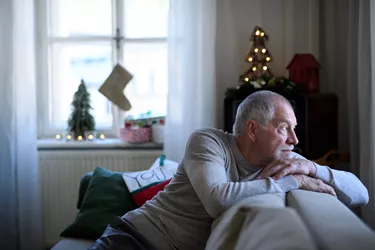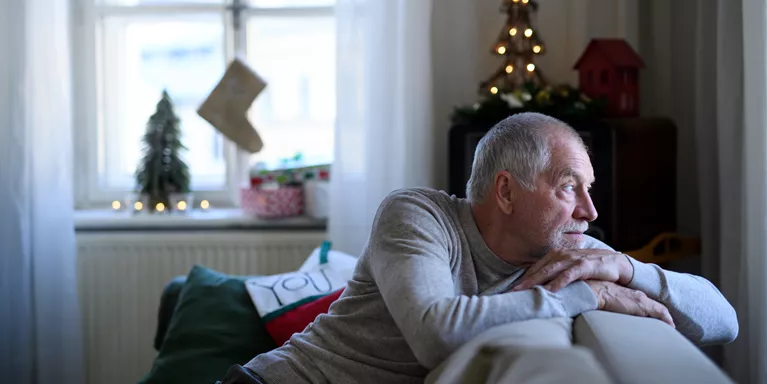Mind podcast - Getting care in a mental health crisis
Rachel talks to Matt Wilkinson from Heart FM about her experience of crisis care in London and Manchester.
- Information on, crisis services
- Mind's campaigning work to improve crisis services
Matt: Welcome to the Mindcast exploring of crisis services. My name’s Matt Wilkinson, and with me today is volunteer Rachel. Rachel, how would you describe your mental health?’
Rachel: I’ve never really got a proper diagnosis, I’ve been diagnosed with lots of things over the years, but essentially depression and anxiety but that doesn’t cover really how fundamentally it has affected my life.
I see it as something which is very serious, there’s no getting round the fact that it’s very serious, I’m not someone with minor mental health difficulties, but it also doesn’t define who I am as a person and I’m not in crisis twelve months of the year; crises happen to everyone, to anyone who has mental health problems, and sometimes to people who don’t have mental health problems.
Matt: So what do you understand by the term ‘being in a crisis’
Rachel: For me, really, it’s whether or not I feel as if I am at risk of committing suicide, but everyone has their own way of describing crisis; it means different things for everyone, and for me, personally, that is the clincher, of what crisis is.
Matt: And how much do you feel you’re in control in situations when you’re in crisis and how much are you depending on other people?
Rachel: Yes, I think when it really hits, it is a lack of control, you lose control, or a fear of losing control, not knowing how at which point I can trust your own actions, and myself, that’s when I feel that I’m in crisis, and there’s certainly been times when I’ve been in crisis, where I've definitely been out of control, without a shadow of a doubt.
But I tried to hold on very strongly to my job, when I had a crisis last year, so I really tried to keep going, but there comes a point when you no longer can, I think, for most people, it falls apart, and you cling on and you cling on and you cling on, and I think that’s probably one of the hardest parts, relating to mental health and employment, it’s that you can’t often really acknowledge that your feelings are so bad, that - this struggling to try and keep your head above water, then it encourages the crisis to take place.
Matt: When you've been in a crisis, what kind of professional help did you get?
Rachel: The first crisis in 2008, it was a bit of a shambles really, I was living in a student house, and my best friend was largely looking after me, she would often end up having to call paramedics, she was very worried about my wellbeing, she thought that I needed to be in hospital, as did my Mum, and we regularly had the paramedics at our house, and the police, and it was all a bit of a drama, and I had to go to Accident and Emergency very regularly, but I found getting help in that situation was very very difficult and on many different levels, quite a distressing experience for me.
Matt: And why was that?
Rachel: Well to start off, the most basic, is having to be, you’re in a psychological crisis, and you’re sat with people, for example on a Friday or Saturday night, who are drunk, drunken injuries.
I’ve been groped in Accident and Emergency during a crisis - a guy got up and started going to the toilet on the floor once right next to me, they're really not what you need - that’s really not what you need, when you’re in a crisis.
And then I have found that, once you get seen by a psychiatrist, they can be very dismissive, and you really have to kind of convince them - I found that I really had to try and convince them that I was ill enough to be in in-patient care, and this carried on over a period of months and it seemed, I still can’t really understand, like it is in Mind’s report, why the patient isn’t listened to, and why their opinion is not given as much clout as it should be.
Matt: So what were the reasons that were given for not accepting you as an in-patient at the time, when you were in Accident and Emergency?
Rachel: Several things, funnily enough never beds, beds was never the issue.
I was told that it was an inappropriate place for me, that it would only make me worse, and having experienced it I do see those arguments, I do understand what those arguments are, but if you’re a risk to yourself, you should be admitted full stop, in my opinion, and I think psychiatrists would agree with that.
But it’s whether they actually think you’re a risk to yourself, and it's how they define that and it certainly seemed to me sometimes, that unless you have made some sort of tangible attempt at hurting yourself, then it’s not believed that you would hurt yourself, and I think that sets a very dangerous precedent.
And it’s a bit of a self-perpetuating cycle, because it makes people do things, which are cries for help, which then undermines what psychiatrists think about what people are doing, and for me I think it’s quite risky, to not believe someone when they say they want to hurt themselves. I think that’s a something where the patient has to be listened to.
Matt: And do you think the problem is, that there may be times when the patient isn’t actually as bad as what they are saying.
Rachel: Yes definitely, I can only speak from my own experience, but also, people I have met along the way, and spoken to and have found that the issue with suicidal thoughts, and suicidal actions, has come up in a lot of conversations I have had, but I do think there is a difference between someone just saying something and in my case you know they had the notes, they could see that I had a long term history of mental illness you know I don’t really understand why you would then not listen to that person, they obviously hadn’t just rolled up and made it up.
My friend and my mum would often be with me, and they would say, Rachel needs help, and they would also be ignored. It feels that the family and friends, who are around someone the whole time, if there’s questions over when someone is going through a crisis, whether they can be totally , I don't want to say believed, because I hate the concept that you wouldn't be believed in a crisis, but there’s obviously some issues when someone’s in a crisis, of how in control they are. But if the family and friends are saying you need help, then surely you should get it, really. But it depends on what the person at the time, decides you have, particularly with me, a person like me without a set diagnosis, and I have been diagnosed in the past as having the very suspiciously named ‘personality disorder’, which I fundamentally disapprove of as a diagnosis, and I think, at the very least needs to be renamed.
But the psychiatrist said to me ‘Well there’s nothing we can do about that’ and when someone’s suicidal, telling them that you can’t make them better, ever, is not a very good idea, I would say.

Matt: And I suppose the problem you get is, if you go to A and E and they refuse you, and you go home, you’re more likely to have another crisis, and if they keep refusing you, you’re going to have these crises, which is totally unhelpful.
Rachel: Exactly, you get more and more and more and more hopeless. You’re just caught in this endless cycle that you do for months on end. Paramedics come in and they say they’ll definitely admit you, going to Accident and Emergency, waiting, calming down, them seeing you, not admitting you. Going for hours and hours, getting home at six o'clock in the morning, having just been waiting there, it just went on for months. That doesn’t make you feel better, at all. But the fact that there doesn’t seem, or at least I know in London there are voluntary alternatives to that, but at the time in Manchester there was really nothing else available, and that needs to be changed.
Matt: What would you say is your preferred method of being helped, when you’re in a crisis?
Rachel: Well, I don’t think it necessarily, well it does exist at the moment. I think crisis houses, which do exist but far too few of them is the obvious best solution. I also think possibly a separate part of Accident and Emergency, for people going through psychiatric crises. I just don’t think they should be mixed with people who are just drunk and disorderly, or who are going to laugh at them, or misunderstand their problems, so either just a separate part of Accident and Emergency, or just direct referral, for example to a crisis team, in my area now, it says on their website you can make self-referrals, but that’s absolutely not true, so to get a referral to the crisis team, or the home treatment team, you have to go to Accident and Emergency, if it’s outside of G.P. working hours, which I don’t think is the best route. I think the crisis team should be self-referable.
Matt: So, have you had experience with the crisis team?
Rachel: I have, yes.
Matt: And do they come to your home?
Rachel: They do.
Matt: And do they arrive in five minutes, with blue lights flashing and sirens blasting, just like the paramedics?
Rachel: No, that would be nice, if they did, but they just come, they do an assessment. Essentially they just come and check on you every day, check you’re OK and that you're coping OK, I had some talking therapy, when I was with them, which was helpful, but they only see you for such a short amount of time, and the referrals they make, it takes so long for those to come to fruition, so I do think crisis teams are a very good thing, definitely, but I think the referral to them needs to be more accessible, for people.
Matt: Have you been treated as an in-patient in time of crisis?
Rachel: I have, I’ve been a private in-patient and an NHS in-patient, both last year.
Matt: What was it like on the NHS ward?
Rachel: Well I’d really heard some horror stories, and I was really quite scared, of going into an NHS ward, and I didn’t find those horror stories to be true.
But there were definitely problems, and definitely ways in which it could be improved. Really basic things such as being dirty, really, really dirty and , more the fact I found it to be a kind of holding cell. Like, as a place of safety, yes, you are to some extent safe, the checks they do are fairly rigorous, but in terms of any sort of recovery I didn’t find, where I stayed, I didn’t find anyone had time to talk to you, even say really ‘how are you? ’ until I think it was about three days in when I had a proper chat with someone, and that struck me very very strange.
And in terms of activities, they did have activities, but they very much catered for, there were some very very seriously ill people there, and I found the activities were very much focused towards them, not to say I wasn't seriously ill. It’s hard to negotiate the wording about, people having psychotic episodes, people who were suicidal, but it’s people with very different needs, and in very different emotional states and all the activities seemed to just want to push everyone together, and it just doesn't work; you can’t put people on such wildly different spectrums of where they are, together, and expect it to be therapeutic for really anyone involved.
Matt: Looking back on your in-patient time last year, how appropriate do you feel that was for your need at the time and what else might have worked?
Rachel: The facilities I was pretty impressed by. There was a nice living room, you could go out into a courtyard, which with me as a smoker made a big difference. You had your own room. Facilities-wise it was great but in terms of my needs, I needed someone to talk to, more than anything and they always said, if you need to talk, come and talk, it's fine. But they were so busy that I personally didn’t feel I could ask, they were really very unwelcoming really, and I don’t blame them personally for that, they were obviously desperately understaffed, and there just wasn’t time for talking to people, and I also found that, in terms of multiple needs, I think there is an argument for having different wards for people suffering sort of depression, personality disorders, suicidal tendencies, to those who are in acute psychotic episodes. I’m very much aware of the issues around this and about the fact that it could be regarded as some sort of psychological or mental illness hierarchy, which I think definitely should be avoided. But, you know, patients were at times abusive and it was really scary. I have no level of judgement for anyone for while they are going through those periods, when I was that ill, having to manage people who were abusive, or behaving in ways that were scary, that was very difficult for me to manage, it really was.
Matt: So, in summary, in what ways would you improve in-patient care in crisis?
Rachel: More talking therapy, more diverse activities, fundamentally different facilities or different wards need to cater for different needs rather than a simple where-beds-available male/ female situation. I just don’t think you can just throw everyone together under the umbrella of mental illness, which covers a huge variety, a massively diverse area of things and needs and how people act and what will help them recover and throw them all together in a boiling pot and expect that to work for everyone, I don’t think that could work. And the food.
Matt: Better food, or more of it?
Rachel: Better food - awful.
Matt: Now, you were talking about Manchester earlier. What was the difference in the sort of care, level of services you got somewhere like Manchester, compared to London?
Rachel: Yes, this is something I feel quite strongly about actually because honestly I don’t like London very much, like I would much rather live in Manchester; services in Manchester are horrendous.
Matt: In your opinion…
Rachel: In my opinion, yes, very much in my opinion and at the time I experienced them, services in Manchester were not very good, and I do feel, as in a lot of ways, in London the services get funded better, that it’s more centralised they get more attention, and particularly than up in the north of England. I think that’s really wrong, and it shouldn’t be a postcode lottery as to where you live, how good the services are.
Matt: Have you used any voluntary-run crisis services?
Rachel: No, interestingly I tried to use one which I’ve heard very good things about. It's the Maytree Service, based very near me in London. And I’ve heard people who’ve been very positive about it, but unfortunately for me, and this is something that has actually come up quite a lot for me in crises, from lots of different angles, people saying your history is too complex, they wouldn’t take me in, they said we’re too much of a short-term solution. And I’ve come across that a lot of times, in Accident and Emergency, doctors, various services that they offer, they say: you need longer term help, your history is too complex. And my response to that is, well yes, I do need longer term help. But I also happen to need it now, and just saying, you’re not going to get any help because you need longer term help, is not really a solution.
Matt: And how would you evaluate the state of crisis services that you’ve experienced? The broad range.
Rachel: Accident and Emergency, like I say I feel can be very unhelpful at certain times when you’re in crisis. The crisis team can be really good and I would encourage people to go down that route if they feel they are safe. But fundamentally, if someone does not feel they are safe, they should be admitted to in-patient care, and they shouldn’t have to argue the case for that; that should be a given.
Matt: Finally Rachel, when you’re in a moment of crisis, what one thing do you most need from other people, be it friends or family?
Rachel: It's understanding, they often can’t understand, so empathy I suppose, a hug, to know you’re loved I think and to know that despite the fact that you may be acting like this - quote marks - crazy person, that you’re still loved and I think that’s the most important thing. And that no-one’s gonna disown you for being difficult. Yeah, love, love.
Matt: Rachel, thank you for talking to me.
Rachel: Thank you for having me.

Information and support
When you’re living with a mental health problem, or supporting someone who is, having access to the right information - about a condition, treatment options, or practical issues - is vital. Visit our information pages to find out more.
Share your story with others
Blogs and stories can show that people with mental health problems are cared about, understood and listened to. We can use it to challenge the status quo and change attitudes.

















